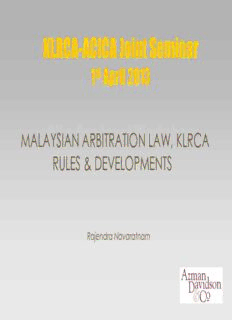
Malaysian Arbitration Law & KLRCA Arbitration Rules and its developments PDF
Preview Malaysian Arbitration Law & KLRCA Arbitration Rules and its developments
KLRCA-ACICA Joint Seminar 1st April 2013 Oil & Gas Legal Workshop MALAYSIAN ARBITRATION LAW, KLRCA RULES & DEVEL OPMENTS Rajendra Navaratnam OVERVIEW • Statutes and Common Law • The New York Convention • Judicial Attitudes • KLRCA Arbitration Rules (as revised in 2012) • The Fast Track Arbitration Rules (as revised in 2012) • The i-Arbitration Rules Malaysian Arbitration Law • Based on Statute and Common Law • Overlaid with Treaty Obligations Statute • Arbitration Act 1952 based on English Arbitration Act 1950 • Arbitration Act 2005,amended in 2011 was a radical update based on UNCITRAL Model Law • Underlying policies expedition of arbitral proceedings, less court interference, separate regimes for domestic and international arbitrations held in Malaysia STRUCURE OF ARBITRATION ACT 2005 • Followed New Zealand’s method of implementing the Model Law • Parts I, II, IV applicable to all arbitrations • Part III, applicable by default to domestic but not to international arbitrations, provides additional court control by -reference on preliminary questions of law(S41) -questions of law arising out of award(s42) - further appeals (s43) STRUCURE OF ARBITRATION ACT 2005 • Part III also provides for -consolidation with consent, -extensions of time for commencing arbitrations and rendering of awards, if specified by the arbitration agreement -costs • Part III can be “opted out” in a domestic arbitration • Part III can be “opted in” in an international arbitration ARBITRATION(AMENDMENT) ACT 2011 • To address weaknesses found in implementation of AA 2005 • Limits court intervention to situations expressly provided for in the Act (Section 8). • Extends powers to stay proceedings to admiralty proceedings (stay of vessels) (Section 10). • Interim measures may be granted even if the seat of arbitration is not Malaysia and court to take arbitral tribunal’s ruling as conclusive. (Section 11). ARBITRATION(AMENDMENT) ACT 2011(CONTD) • Parties may select the substantive law applicable to the arbitration (Section 30). • Determination of the validity of an arbitration agreement may be made in accordance to the laws of the State where the award was made (Section 39). JUDICIAL ATTITUDES • Have been traditionally supportive of arbitration • Low percentage of Awards set aside • Improved further with AA 2005 • Courts generally take a hands off approach upholding the policy of the Act JUDICIAL ATTITUDES • Uphold NY Convention obligations: Lombard Commodities v Alami Vegetable Oil Products Sdn Bhd [2010] 2 MLJ 23(FC) • Follow international norms in scrutinising awards: The Government of India v Cairn Energy India Pty Ltd & Anor[2011] 6AMR 573(FC)
Description: